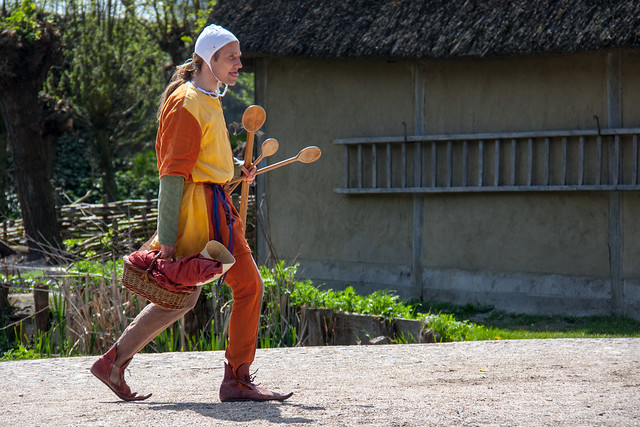Podcast: Play in new window | Download
Today we’re delving into the origins of the word lead.
lead [lɛd] is:
- a soft, heavy, metallic element with atomic number 82 found mostly in combination and used especially in alloys, batteries, and shields against sound, vibration, or radiation.
- a thin strip of metal used to separate lines of type in printing.
It comes from the Middle English le(e)d [lɛːd] (lead, cauldron), from the Old English lēad [læɑːd] (lead), from the Proto-West-Germanic *laud (lead)), from the Gaulish *laudon (lead), from the Proto-Celtic *ɸloudom (iron), from the PIE *plewd- (to fly, flow, run) [source].
Words from the same Proto-West-Germanic root include lood [loːt] (lead, plumb bob) in Dutch, Lot [loːt] (plummet, solder) in German, and lod [lʌð] (plumb bob, fishing weight) in Danish [source].
Words from the same Proto-Celtic root include luaidhe [ˈl̪ˠuːiː/l̪ˠuəjə] (lead) in Irish and Scottish Gaelic, leoaie (lead) in Manx [source].
Words from the same PIE root include float, flow, flood, fleet and Pluto in English, vlotten (to glide, go smoothly) in Dutch, and flotter [flɔ.te] (to float, flutter, wave, mill about) in French [source].
Incidentally, to word lead [liːd], as in to guide or direct, is not related to lead (the metal). It comes from the Middle English leden (to lead, carry, take, put), from the Old English lǣdan (to lead, bring, take, carry, guide), from the Proto-Germanic *laidijaną (to cause one to go, lead), causative of the Proto-Germanic *līþaną (to go, pass through), from Proto-Indo-European *leyt- (to go, depart, die) [source].
Here’s a video I made of this information:
Video made with Doodly [afflilate link].
I also write about words, etymology and other language-related topics on the Omniglot Blog, and I explore etymological connections between Celtic languages on the Celtiadur.
You can also listen to this podcast on: Apple Podcasts, Amazon Music, Stitcher, TuneIn, Podchaser, PlayerFM or podtail.
If you would like to support this podcast, you can make a donation via PayPal or Patreon, or contribute to Omniglot in other ways.











